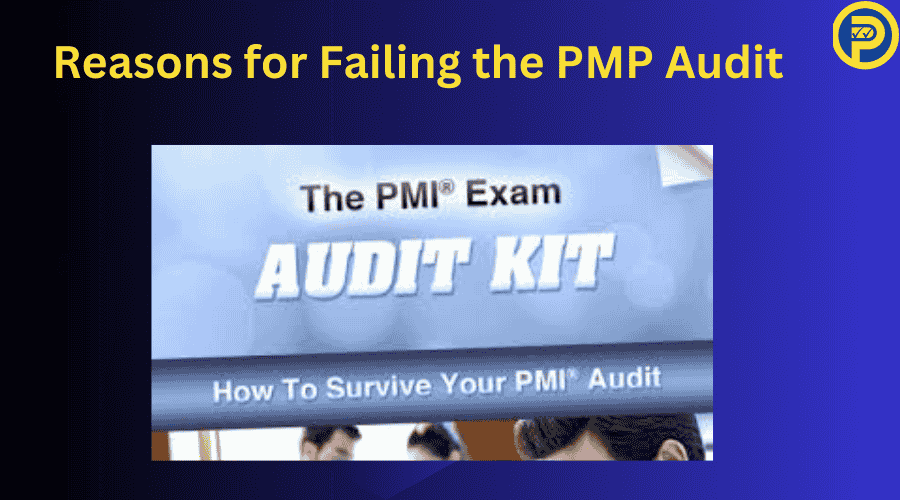The Project Management Institute (PMI) conducts audits to maintain the integrity and credibility of its certification process, especially for the Project Management Professional (PMP) credential.
If you’re pursuing PMP certification, it’s common to have concerns, and the thought of failing an audit can be particularly daunting. You’re not alone in your worries; many candidates share the same anxiety about what might happen if they are selected for an audit and do not pass. In fact, numerous professionals find themselves more apprehensive about the audit process than the PMP exam itself.
But there’s no need to worry; this article is here to help. If you’re currently doing PMP training and preparing your application, keep reading for useful tips to avoid the common problems that can come up during an audit.
Reasons for PMP Audit Failure
There are several reasons why an audit may result in failure:
- Inability to Verify Information
If the PMI audit team cannot confirm your education or experience, it can lead to a failure. This often occurs when applicants do not provide sufficient detail about their project management experience or if the projects listed do not meet the necessary criteria.
- Non-Compliance
Choosing not to engage with the audit process can also result in failure. If you do not respond to requests for information or fail to submit all required documentation, PMI will classify this as a non-compliance issue, leading to a one-year suspension before you can reapply.
- Fraudulent Information
Providing false information intentionally is the most severe violation. If PMI determines that you have submitted fraudulent data, you will face a lifetime ban from applying for any PMI certification.
Common Reasons for Failing the PMP Audit (and How to Avoid Them)
What could cause your PMP application to fail the audit? Here are some common reasons based on insights from candidates, along with tips to help you avoid these issues.

Listing Non-Project Experience
PMI only considers project-based work. If it’s unclear that your entries describe true project experience, they may disqualify this portion of your application.
Tips:
- Provide clear descriptions of your projects.
- Define the project’s objective briefly.
- Summarize project deliverables by process area (e.g., specify the documents you managed).
- Add a single sentence on the project outcome.
Experience Entries Don’t Meet PMP Requirements
The experience listed on your application must align with the PMP process areas (initiating, planning, executing, monitoring and controlling, and closing). PMI needs to see that you led and directed project tasks, with experience in each process area.
Your application should collectively show your knowledge across the entire Exam Content Outline, even if not every project covers every process area.
Tips:
- Ensure your application includes all process areas.
- Use PMI terminology to describe your activities and tools used.
- Highlight different knowledge areas across your projects.
- Focus on key contributions for each project and describe what you did specifically, rather than general responsibilities.
Submitting Incomplete Audit Documents
PMI requires all audit documents to be submitted in one complete package. Sending an incomplete submission will result in automatic failure.
Tip: Double-check that you have all required materials before responding to the audit request.
Combining Information Across Projects
PMI reviews each project individually, so combining smaller projects into one entry can result in a failed audit.
Tips:
- List each project separately, even if they were small.
- Avoid grouping multiple projects together.
Including Volunteer Projects
Although unpaid projects may provide valuable experience, PMI only considers projects that represent professional, compensated work. Including volunteer work can lead to failure.
Tip: Only include projects where you were compensated.
When the Situation is Beyond Your Control
Sometimes, an audit failure happens through no fault of your own. For example, if your company has closed or your supervisor is unavailable, you may be unable to verify information for PMI. In this case, although the audit may not pass, you’re allowed to reapply once the issue is resolved. There will be no suspension in such situations.
If You Choose Not to Complete the Audit
If you decide not to continue with the PMP audit process, PMI will restrict you from reapplying for the PMP exam for one year.
Immediate Consequences of Failing an Audit
Failing a PMI audit can lead to several immediate consequences:
- One-Year Suspension: If your failure was due to non-compliance (e.g., not submitting required documents), you will typically face a one-year suspension before being eligible to reapply.
- Lifetime Ban: In cases where fraud is identified, you will be permanently banned from taking any PMI exams. This consequence underscores the importance of honesty in your application process.
- Financial Loss: Failing an audit often means losing any fees associated with the application process, including the audit fee itself. For instance, even if your situation was outside your control, you may still incur costs without receiving any certification.
NOTE: Once you successfully pass the PMI audit, it’s advised to enroll in a PMP test prep program to effectively prepare for the exam
What Happens Next After Failing a PMP Audit?
If you fail a PMI audit, understanding your options and next steps can help you move forward confidently.
First, consider reapplying after suspension. Following a one-year suspension, you are eligible to reapply for the PMP exam. However, it’s essential to address any factors that may have led to the initial audit failure. This could mean gathering more thorough documentation of your project management experience or ensuring that all details you provide are accurate and easily verifiable.
Next, focus on correcting mistakes. If the audit failure seems to stem from misunderstandings or documentation errors rather than intentional misrepresentation, reach out to PMI’s customer service. They can offer valuable guidance on rectifying any issues so that you’re better prepared before reapplying.
Finally, it’s important to understand the audit criteria PMI uses. Familiarize yourself with PMI’s requirements for acceptable project management experience. This includes confirming that all projects listed are paid roles and providing a clear, detailed account of your contributions to each project individually. Avoid combining multiple projects in one description to prevent confusion and better meet PMI’s standards.
Strategies to Pass the PMI Audit
To improve your chances of passing a future audit:
- Detailed Documentation: Ensure that each project listed in your application is described in detail, highlighting specific roles and responsibilities while using terminology consistent with PMI standards.
- Seek Guidance: Engage with peers or mentors who have successfully navigated the PMP application and audit process. Their insights can be invaluable in preparing a robust application.
- Review PMI Resources: Take advantage of resources provided by PMI, including guidelines on how to fill out applications and what constitutes valid project management experience.
Continue Reading: What is the passing score for the PMP Examination?
FAQS
What Happens if You Fail an Audit?
If you fail a PMP audit, the consequences depend on the reason. If it's due to circumstances beyond your control, you can reapply once resolved. If you refuse to participate, you’ll face a one-year suspension before reapplying. However, if you provide false information, you will be permanently banned from all PMI exams. Accurate documentation is crucial to avoid issues.
What Are the Odds of Getting Audited by PMP?
The odds of being audited for the PMP exam are relatively low, with PMI randomly selecting approximately 5% of applicants for this process. While being chosen for an audit can be concerning, it is a routine part of PMI's quality control measures to ensure that applicants meet the necessary qualifications. Therefore, you should not view an audit as a negative reflection on their capabilities.
What Happens if You Fail PMP Test?
If you fail the PMP exam, you will receive a score report detailing your performance across different process groups. You can retake the exam up to two times within your one-year eligibility period by submitting a re-examination form and paying the associated fee. After three unsuccessful attempts, you must wait one year before reapplying for the exam.
To minimize the likelihood of failing the PMP Exam, it is essential to prepare thoroughly. One effective strategy is to take multiple practice tests.

